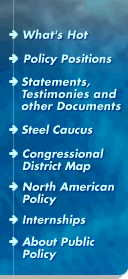|
INSTITUTE-WIDE
PUBLIC POLICY POSITIONS
While the AISI's Public Policy Handbook states the policy
positions of AISI's U.S.
producer members, it is important to note that a number of these
positions are shared by AISI's Canadian and Mexican
producer member companies as well. Following are examples of
policy positions supported by the Institute's membership across the
Board:
- Competitiveness of North American steel industry. All
support market-based policies that will enhance the
competitiveness of NAFTA steel producers — and steel as the
material of choice for manufacturing customers. All oppose
policies that will impair the competitiveness of NAFTA steel
producers and steel's position vis'-a-vis' competing
materials.
- Environmental matters. All agree that, on a life cycle
basis, steel has many important advantages over competing
materials. On global climate change, all support the view that
global environmental problems require global — not unilateral —
solutions, and all support the need for flexible, non-binding
goals — not hard targets — based on good science. On new standards
for particulate matter, all support the position that any new
standards must be based on common sense, sound science and
appropriate cost-benefit and risk analysis.
- Electricity policy. Despite the varying roles of
government in electricity policy in the NAFTA countries, all
members support the concept that customer choice and more open
competition in electricity supply — in retail as well as wholesale
markets — would enhance the competitiveness of North American
producers of steel and steel-intensive products.
- Market-distorting government practices: the CAFE
example. On Corporate Average Fuel Economy (CAFE) standards,
all support ongoing market-based efforts to promote
energy-efficient vehicles in keeping with the industry's
commitment to energy conservation. All consider CAFE standards to
be counterproductive in terms of energy saving, unnecessary
government interference in market forces and harmful to NAFTA auto
producers. All would like to see CAFE standards frozen at current
levels, and all would oppose any efforts to broaden or increase
these standards.
- A market approach to transportation. On transportation
issues in general, all support a deregulated market approach, the
goal of increasing efficiency of transportation services, and
therefore the need to harmonize truck weight maximums among NAFTA
countries.
- Proper role and use of international standards. All
agree that proposed new International Standards Organization (ISO)
standards (e.g., on environmental management and occupational
health and safety) should not disadvantage steel as a material or
act as a barrier to sales by NAFTA steel producers abroad.
- Trade with non-NAFTA countries. All support the need to
keep national trade laws effective with respect to unfair trade
from non-NAFTA countries, and all support consideration among
NAFTA governments of a more coordinated approach to such unfair
trade. A case-in-point is the concern that all have recently
expressed about NAFTA imports from members of the Commonwealth of
Independent States (CIS) — and the possibility of trade diversion
due to the European Union's quotas on imports of steel from the
CIS. Another common concern is South Korean unfair trade practices
affecting price and export controls. On the export side, all
support the need to bring down trade barriers in non-NAFTA
countries so that world-class North American producers of steel
and steel-containing goods (e.g., NAFTA automakers) can increase
exports to Asia and other world markets. Finally, all support the
view that accession of China and other "economies in transition"
to the World Trade Organization should only occur on commercially
viable terms.
Employee
Relations | Energy | Environment
| Tax |
Trade |
Other
Issues | Position
Papers | Home
|


